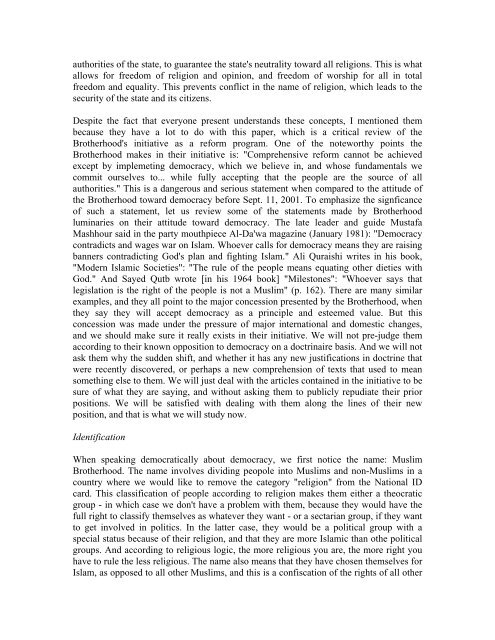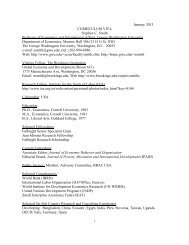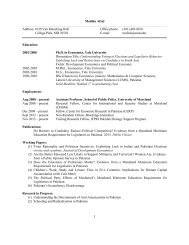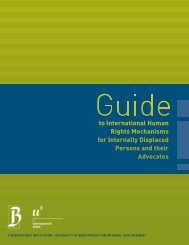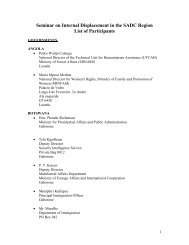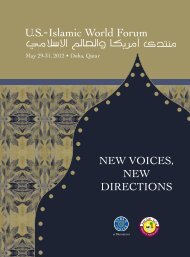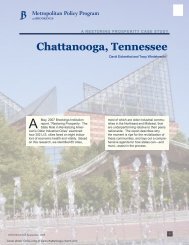The Muslim Brotherhood's Initiative as a Reform Program
The Muslim Brotherhood's Initiative as a Reform Program
The Muslim Brotherhood's Initiative as a Reform Program
Create successful ePaper yourself
Turn your PDF publications into a flip-book with our unique Google optimized e-Paper software.
authorities of the state, to guarantee the state's neutrality toward all religions. This is what<br />
allows for freedom of religion and opinion, and freedom of worship for all in total<br />
freedom and equality. This prevents conflict in the name of religion, which leads to the<br />
security of the state and its citizens.<br />
Despite the fact that everyone present understands these concepts, I mentioned them<br />
because they have a lot to do with this paper, which is a critical review of the<br />
<strong>Brotherhood's</strong> initiative <strong>as</strong> a reform program. One of the noteworthy points the<br />
Brotherhood makes in their initiative is: "Comprehensive reform cannot be achieved<br />
except by implemeting democracy, which we believe in, and whose fundamentals we<br />
commit ourselves to... while fully accepting that the people are the source of all<br />
authorities." This is a dangerous and serious statement when compared to the attitude of<br />
the Brotherhood toward democracy before Sept. 11, 2001. To emph<strong>as</strong>ize the signficance<br />
of such a statement, let us review some of the statements made by Brotherhood<br />
luminaries on their attitude toward democracy. <strong>The</strong> late leader and guide Mustafa<br />
M<strong>as</strong>hhour said in the party mouthpiece Al-Da'wa magazine (January 1981): "Democracy<br />
contradicts and wages war on Islam. Whoever calls for democracy means they are raising<br />
banners contradicting God's plan and fighting Islam." Ali Quraishi writes in his book,<br />
"Modern Islamic Societies": "<strong>The</strong> rule of the people means equating other dieties with<br />
God." And Sayed Qutb wrote [in his 1964 book] "Milestones": "Whoever says that<br />
legislation is the right of the people is not a <strong>Muslim</strong>" (p. 162). <strong>The</strong>re are many similar<br />
examples, and they all point to the major concession presented by the Brotherhood, when<br />
they say they will accept democracy <strong>as</strong> a principle and esteemed value. But this<br />
concession w<strong>as</strong> made under the pressure of major international and domestic changes,<br />
and we should make sure it really exists in their initiative. We will not pre-judge them<br />
according to their known opposition to democracy on a doctrinaire b<strong>as</strong>is. And we will not<br />
<strong>as</strong>k them why the sudden shift, and whether it h<strong>as</strong> any new justifications in doctrine that<br />
were recently discovered, or perhaps a new comprehension of texts that used to mean<br />
something else to them. We will just deal with the articles contained in the initiative to be<br />
sure of what they are saying, and without <strong>as</strong>king them to publicly repudiate their prior<br />
positions. We will be satisfied with dealing with them along the lines of their new<br />
position, and that is what we will study now.<br />
Identification<br />
When speaking democratically about democracy, we first notice the name: <strong>Muslim</strong><br />
Brotherhood. <strong>The</strong> name involves dividing peopole into <strong>Muslim</strong>s and non-<strong>Muslim</strong>s in a<br />
country where we would like to remove the category "religion" from the National ID<br />
card. This cl<strong>as</strong>sification of people according to religion makes them either a theocratic<br />
group - in which c<strong>as</strong>e we don't have a problem with them, because they would have the<br />
full right to cl<strong>as</strong>sify themselves <strong>as</strong> whatever they want - or a sectarian group, if they want<br />
to get involved in politics. In the latter c<strong>as</strong>e, they would be a political group with a<br />
special status because of their religion, and that they are more Islamic than othe political<br />
groups. And according to religious logic, the more religious you are, the more right you<br />
have to rule the less religious. <strong>The</strong> name also means that they have chosen themselves for<br />
Islam, <strong>as</strong> opposed to all other <strong>Muslim</strong>s, and this is a confiscation of the rights of all other


